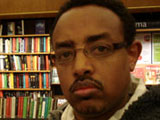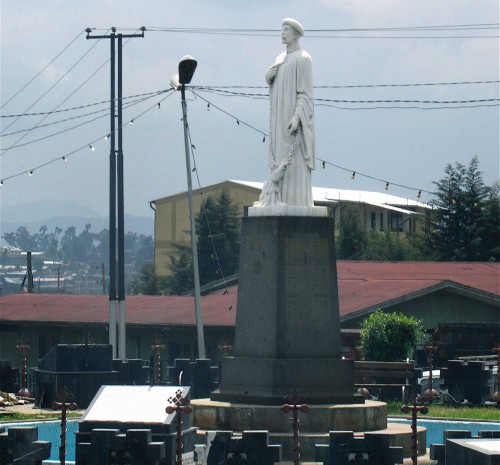Balancing Development With Preservation
by Mesfin Negash / November 30, 2012 / 1 Comment
Will Ethiopia’s heritage be sacrificed for economic development? It must be debated.
Addis Ababa, the capital of Ethiopia and the diplomatic centre of Africa, is celebrating her 125th anniversary. The anniversary, however, is marred not only by the lingering ghostly billboards of the late dictator suffocating all notable public spaces, but also by a controversial move from the city administration. For an upcoming construction project the city administration is about to move one, probably two, historically significant monuments located in the heart of the city. The two monuments are of the founder of Addis Ababa, Emperor Menelik, and a patriotic bishop, Abune Petros, who was killed by Italian fascist forces in 1936 for his resistance.

- Why does a country with her own unique alphabet and long history of writing persist to deny citizens the right to freedom of expression in this era of Expression? No other country in Africa may typify this paradox more than Ethiopia. As Leopold Senghor’s famous collection of poems entitled “Ethiopiques” remained ‘powerful and popula’ so does the source of his intriguing title, Ethiopia, in her own ways. In “Ethiopiques,” I share Ethiopian views on pertinent issues related to journalism, culture and, of course, the overarching subject of politics.

- Mesfin Negash is an Ethiopian journalist living in exile in Sweden. He is one of the journalists accused of “terrorism” in 2011 by the Ethiopian government. The co-founder and first editor-in-chief of an acclaimed Ethiopian newspaper, Addis Neger, he is currently the Managing Editor of Addisnegeronline.com. He is a political science student by training and known for his critical commentaries on significant political and social issues.
The two monuments stand very near their respectively historical spots: For the emperor it is in front of the church where he won the Battle of Adwa against Italian aggressors in 1896; Abune Petros’s monument supposedly stands where he was executed by an Italian firing squad. Now a new light rail line is slated to cut through the street where the two monuments have stood for more than half a century.
After days of public confusion and uproar the city administration announced that a tunnel is to be built under Archbishop Petros’s monument, and at the completion of the construction the monument will be returned to its place. The project won’t touch the Emperor’s monument, according to the statement. But in the tradition of a typical dictatorship, neither the federal government nor the city administration found it necessary to consult relevant agencies or the public before starting such a politically and historically sensitive project. Much confusion and anger could have been prevented if the city administration had any sense of accountability and transparency. Furthermore, many people remained suspicious of the plan even following the belated official explanation, and the public is still in the dark about detailed arrangements in regard to the two monuments.
Setting aside the administrative aspect of this controversial move, the incident is another reminder of the divisive nature inherent in maintaining a balance between preserving (historical and social) values and the consequences of economic development. For some, (re)moving the monument(s) is a well-calculated political action aimed at undermining or dismantling the historical heritage of the nation. For others, it’s a cost we should pay to see the city—and by extension, the society—have a well developed infrastructure and social services.
Few find such questions easy to answer, especially when the values in question don’t belong to their specific religious, ethnic, or tribal group. However, this is beyond the question of to whom one object or value belongs. Rather, this is about our conception of economic development and the value that individuals and societies attach to historically and culturally important objects and ways of life. What is the lesson from the experience of the developed nation? What are the unavoidable social, spiritual and cultural costs a society should pay to realize economic and material development? At the heart of any meaningful development is a deeper understanding of what to preserve and what to forgo.
Unfortunately, societies under totalitarian dictatorship, such as Ethiopia, have very little chance to deliberate such pertinent subjects. Regardless of this fact, it deserves a sensible debate in all available platforms.






One Comment on "Balancing Development With Preservation"
Ahora la pareja está a punto de casarse, mientras que Goodwin sonríe valientemente desde la banca con dolor, anhelo no correspondido y tiene lágrimas.